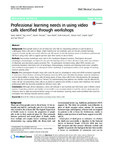Professional learning needs in using video calls identified through workshops
| dc.contributor.author | Statton, S | |
| dc.contributor.author | Jones, Ray | |
| dc.contributor.author | Thomas, M | |
| dc.contributor.author | North, T | |
| dc.contributor.author | Endacott, Ruth | |
| dc.contributor.author | Frost, A | |
| dc.contributor.author | Tighe, D | |
| dc.contributor.author | Wilson, G | |
| dc.date.accessioned | 2016-06-04T17:24:33Z | |
| dc.date.available | 2016-06-04T17:24:33Z | |
| dc.date.issued | 2016-05-10 | |
| dc.identifier.issn | 1472-6920 | |
| dc.identifier.issn | 1472-6920 | |
| dc.identifier.other | 140 | |
| dc.identifier.uri | http://hdl.handle.net/10026.1/4827 | |
| dc.description.abstract |
BACKGROUND: Most people want to die at home but only half do. Supporting patients in rural locations is challenging. Video calls such as Skype, might help but are not routinely used; we should consider learning needs to increase uptake and ensure effective use. We aimed to identify learning needs of healthcare professionals (HCPs) in using video calls to support patients (and their carers) to die at home. METHODS: Face-to-face workshops were held in five Southwest England locations. Participants discussed advantages, disadvantages, scenarios for use, and the learning needs of video call users. Ideas were documented on flipcharts and discussions audio-recorded. The 116 participants included nurses, allied HCPs, doctors and previously bereaved volunteers. Lists of advantages, disadvantages, scenarios and learning needs were compiled and circulated to participants. In a subsequent online workshop, 21 participants ranked seven groups of learning needs in priority order. RESULTS: Most participants thought video calls could be used to advantage in many end-of-life scenarios, especially in rural areas. Seven themes, covering 59 learning needs for HCPs, were identified (in priority order): (i) confidence and technical ability in using video calls; (ii) being aware of how video calls fit into clinical practice; (iii) managing video calls; (iv) communication skills on 'camera'; (v) understanding how patients and families may be affected by video call use; (vi) presenting video calls as an option to patients and families to assess their readiness; (vii) normal professional skills that become essential for effective video calls. CONCLUSIONS: Although almost ubiquitous, video call software is not routinely and effectively used in British clinical practice. Supporting patients and families at end-of-life is one example where it could be used to advantage, but clinicians need to plan and practise before using it in real situations. Learning needs were identified that could be developed into learning modules and/or courses. | |
| dc.format.extent | 140- | |
| dc.format.medium | Electronic | |
| dc.language | en | |
| dc.language.iso | en | |
| dc.publisher | Springer Science and Business Media LLC | |
| dc.subject | End-of-life | |
| dc.subject | Clinical education | |
| dc.subject | Learning needs | |
| dc.subject | Video calls | |
| dc.title | Professional learning needs in using video calls identified through workshops | |
| dc.type | journal-article | |
| dc.type | Journal Article | |
| dc.type | Research Support, Non-U.S. Gov't | |
| plymouth.author-url | https://www.webofscience.com/api/gateway?GWVersion=2&SrcApp=PARTNER_APP&SrcAuth=LinksAMR&KeyUT=WOS:000375685100003&DestLinkType=FullRecord&DestApp=ALL_WOS&UsrCustomerID=11bb513d99f797142bcfeffcc58ea008 | |
| plymouth.issue | 1 | |
| plymouth.volume | 16 | |
| plymouth.publication-status | Accepted | |
| plymouth.journal | BMC Medical Education | |
| dc.identifier.doi | 10.1186/s12909-016-0657-6 | |
| plymouth.organisational-group | /Plymouth | |
| plymouth.organisational-group | /Plymouth/Faculty of Health | |
| plymouth.organisational-group | /Plymouth/Faculty of Health/School of Nursing and Midwifery | |
| plymouth.organisational-group | /Plymouth/REF 2021 Researchers by UoA | |
| plymouth.organisational-group | /Plymouth/REF 2021 Researchers by UoA/UoA03 Allied Health Professions, Dentistry, Nursing and Pharmacy | |
| plymouth.organisational-group | /Plymouth/Research Groups | |
| plymouth.organisational-group | /Plymouth/Research Groups/Institute of Health and Community | |
| plymouth.organisational-group | /Plymouth/Users by role | |
| plymouth.organisational-group | /Plymouth/Users by role/Academics | |
| dc.publisher.place | England | |
| dcterms.dateAccepted | 2016-04-28 | |
| dc.identifier.eissn | 1472-6920 | |
| dc.rights.embargoperiod | Not known | |
| rioxxterms.versionofrecord | 10.1186/s12909-016-0657-6 | |
| rioxxterms.licenseref.uri | http://www.rioxx.net/licenses/all-rights-reserved | |
| rioxxterms.licenseref.startdate | 2016-05-10 | |
| rioxxterms.type | Journal Article/Review | |
| plymouth.oa-location | https://bmcmededuc.biomedcentral.com/articles/10.1186/s12909-016-0657-6 |


